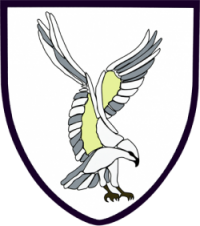Playing Record : P30, W15, D8, L7, Pts for 172, Pts against 80.
Club Captain : Albert Jenkin
Leading Try Scorer : R Messer 7
Leading Points Scorer : Billy Bancroft 37
Capped v England : Billy Bancroft, Albert Jenkin
Capped v Scotland : Billy Bancroft
Capped v Ireland : Billy Bancroft
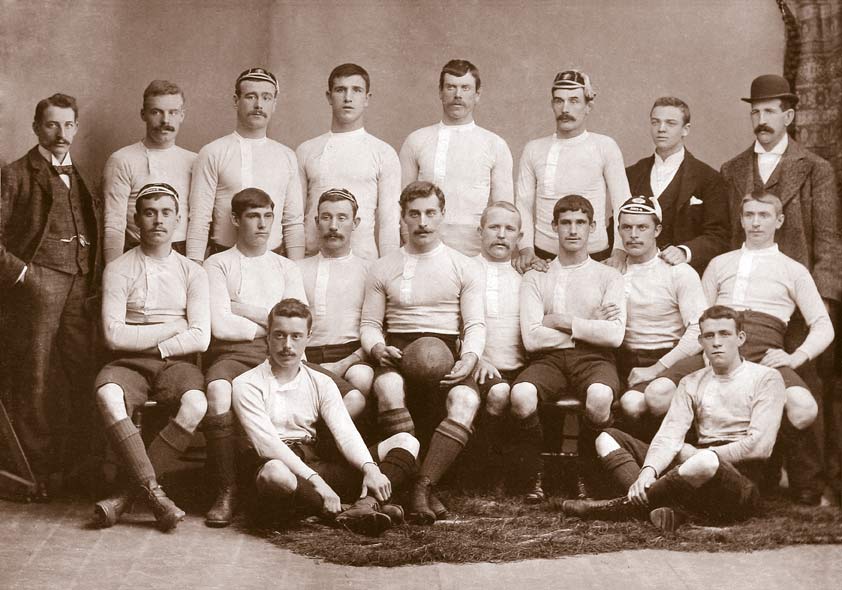
Swansea RFC 1st XV 1895-96 Season (early photo)
Back Row L to R: Ted Poole (trainer), R S Jenkin(Forward), R Grey(Forward), D Williams(Forward), T Jackson(Forward), W S Smith(Forward), Gil Evans(Capt. 2nd XV), W Bowen(Umpire).
2nd Row(sitting) L to R: F Gordon(3/4), R Croker(3/4), R Oldham(Forward), A M Jenkin(Forward)[Capt.], S Rice(Forward), S Croker(3/4), R Thomas(Forward), R Messer(3/4).
Front Row L to R: W Prescott(1/2), J Morgans
This 1st XV team photograph was taken we know, at the beginning of the 1895-96 season as it depicts Albert Jenkin as Captain. He found the extra duties that fell to the Captain’s lot too much in conjunction with his work. He rescinded the Captaincy in November which was passed on to J Prescott (see other team photo below). Keeping in touch with other players and committee members in the 1890’s involved much travelling.
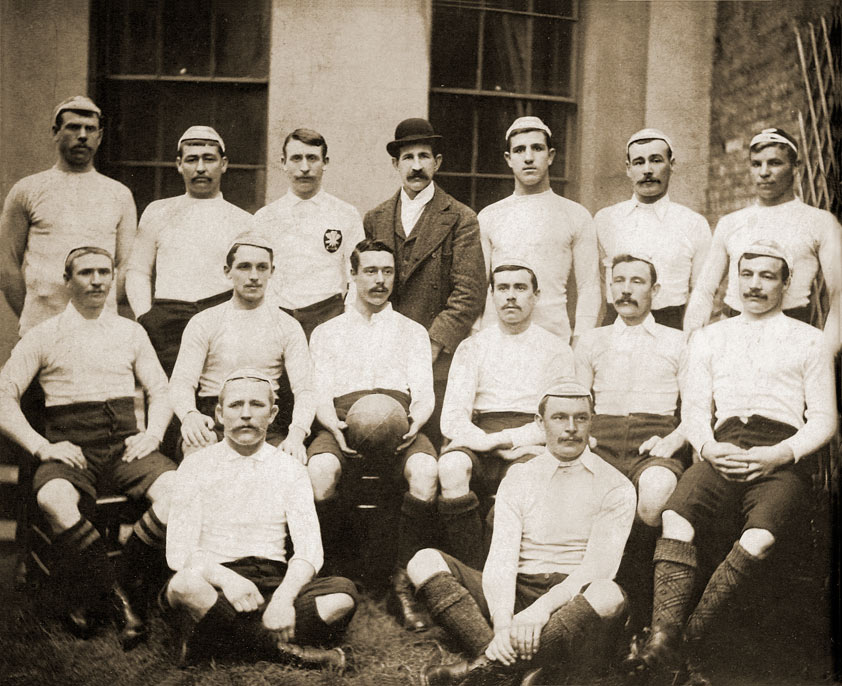
Swansea RFC 1895-96 (late)
This photograph dates from after Albert jenkin rescinded the captaincy of the 1st XV in November 1895 and before the reinstatement of the James brothers (see below) in January 1896.
Back row L to R: T Jackson, T Jones, W J Bancroft, W Bowen (Umpire), J Williams, W Grey, W Parker.
Middle row L to R: R Messer, W Richards, J Prescott [Captain], F Gordon, W E Oldham, W J Williams.
Front row L to R: S Rice, R Thomas.
Teddy Thorogood passed the captaincy of Swansea Rugby Club on to A M (Albert Mortimer) Jenkin for the start of the 1895-96 season. He was appointed at the AGM and undertook the continued improvement of the Club’s form. First capped the previous season in Cardiff in the win against Ireland (1895) aged just 22 years, Jenkin a local Uplands boy was a student of mining and went on to qualify as a mining engineer. He found however, that the myriad tasks which befell the roll of captaining a senior Club ate greatly into his time and had to rescind the post in November 1895 “because of professional duties”. In an age without telephone communication, keeping in touch with all the players and committee was almost a full time job in itself and Jenkin was unable to continue. In 1902 he answered a greater calling and was ordained and following missionary work, also served as a chaplain in the Great War. Another departure this season was W Bryant the Club Secretary who left for work in the West Country with the best wishes of Swansea for his services.
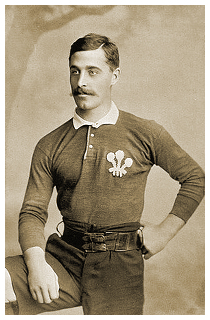
Albert Mortimer Jenkin played as a forward for Wales on 2 occasions (Ireland 1895 and England 1896). He made his debut for Swansea in 1893 and was made captain in 1895/96 but resigned in the November ‘because of professional duties’. J Prescott took over as captain for the remainder of the season. He also played for Cambridge University and Glamorgan. He was ordained in 1902 and during the 1st World War served as an army chaplain in East Africa. He later became Archdeacon of Pretoria.
(Courtesy Bleddyn Hopkins)
Jenkin’s departure left the Club in somewhat of a quandry and initially J Prescott was persuaded to take the baton of captaincy. He appears in a later team photograph (see below) of the 1st XV of 1895-96 but it was the persuasive powers and onfield example of W J Bancroft that were the primary guiding force of Swansea in this season. Having grown in maturity since his first stint as captain in 1893-94, he finished this season as top points scorer.
The difficult start to the season was reflected in early results but the needed shot in the arm came in January of 1896 when the English Rugby Union reopened the James Brothers case. The Swansea half back stars who had not played for the Club since spring of 1893 were still under censure, accused of being ‘induced’ to play for Broughton Rangers (in Manchester) instead of Swansea. in other words of professionalism. This had resulted in the Welsh Union preventing them playing for Swansea in a similar stance against professionalism and the players being effectively in limbo. Their fortunes seemed intertwined with those of the Club as their silky skills and crowd pleasing antics were missed at St Helens and by the National Team. On 31st January 1896 the meeting’s results were wired from London and Swansea Ironmonger J S Brown announced the results in the Swansea skies with a pre-arranged signal from their powefull beacon lamps. The James Brothers were reinstated (see official letter below) and played at St Helens to great cheers on 1st February.
It took time for the reinstated half backs to find form with new team mated but as the match fitness returned and they bedded in, Swansea fans were treated to flashes of their old form such as in the fine win against Llanelli where they created scoring moves as of old. Their rehabilitation was shown in a win over Gloucester where the effect of their presence inspired the whole side to overcome the strong English Club. That day Bancroft scored a try but missed five attempts at goal. The diminutive full back was not infallable after all! His contribution to the season along with the growing prowess of young Frank Gordon boded well for the future. The season ended with tremendous wins over Llanelli and London visitors Old Merchant Taylors.
Billy Bancroft was ever present at full back for Wales in the three Internationals. After losing a man early on Wales’ 14 men succumbed 25 – 0 at Blackheath to England then beat Scotland at Cardiff ( 6 – 0) and lost to Ireland (8 – 4) at Landsdown Road. A M Jenkin ended his Swansea career this season with his second and last International appearance in the game against England.
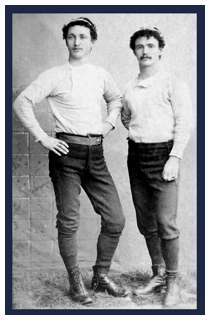
Evan James(left) and David James (right) were a famous half back pairing known as ‘the Swansea gems’ or ‘the curly-headed marmosets’. They first played for Swansea in 1889 and represented Wales on 5 (Evan) and 4 (David) occasions, playing together 4 times.
The brothers apparently played a game for Broughton Rangers in April 1892 and were offered jobs at £2 a week in Manchester. The Rugby Football Union declared them to be professional as a consequence of this. They were reinstated by the RFU upon appeal (by both the Welsh Union and Swansea) on 31 January 1896 and played until they became professional again on 28 January 1899 when Broughton Rangers signed them up (£225 down, £2 a match and a pub), taking all sixteen members of the James family. (club Archive)
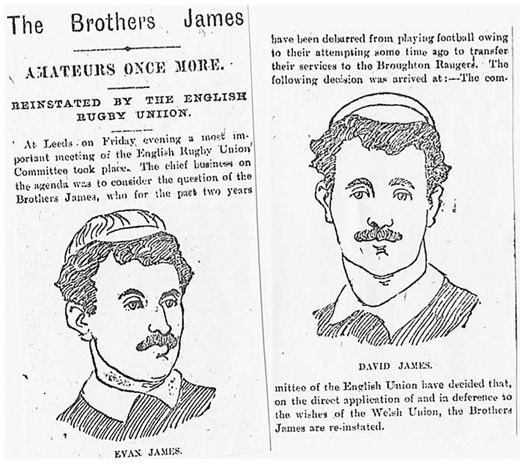
This news article describes the reinstatement of the James brothers by the RFU.
(Courtesy Swansea Library)
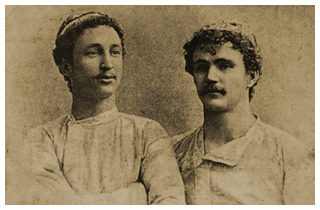
A photo taken of the James brothers Evan (left) and David at the time of their reinstatement by the RFU in 1896. (Club Archive)
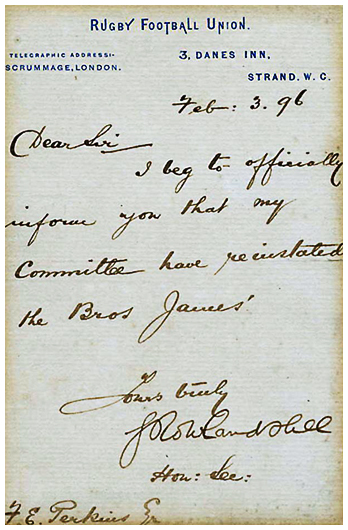
This is the original RFU letter to Swansea confirming the reinstatement of the James brothers. Although the letter was dated 3 February, they were officially reinstated on 31 January and played the following day against Cardiff.
(Club Archive)
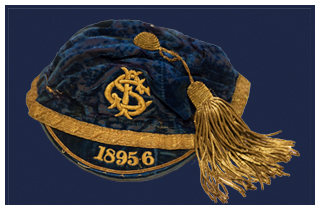
David and Evan James were reinstated by the RFU on 31st Jan 1896 having been debarred from playing due to accepting payment from northern English Club Broughton Rangers. This cap marks the well received return of the brothers who played from February for Swansea, hense they do not appear in the team photos which were taken before their reinstatement.
(Cap kindly made available for photograph by John & Ira Preece. Ira Preece is the Granddaughter of David James)
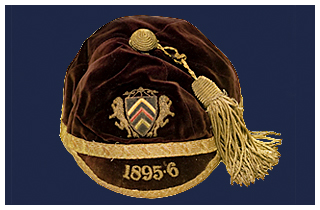
As the James brothers returned to the fold of Welsh rugby in 1896 they also turned out for Glamorgan County. This is David James’ 1895-96 County Cap.
(Cap kindly made available for photograph by John & Ira Preece. Ira Preece is the Granddaughter of David James)
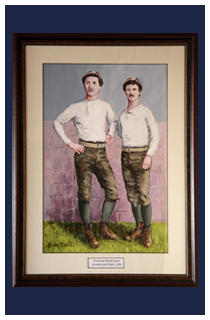
This is an acrylic painting (on pittura) of the James brothers specially commissioned by Swansea Rugby Club and painted by sports artist and former Welsh International Brian Davies. It currently hangs in the St Helens Lounge at the Club. More of Brians work can be seen at www.brian-davies.com
(Club Archive)
